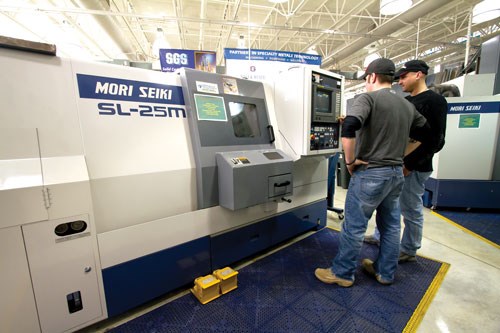Stark State College Increases Students' Employment Prospects through Building Industry-Recognized Credentials
Since its inception in 1960, Stark State College in North Canton, Ohio, has maintained its mission of providing regional manufacturers with students prepared with skills in the engineering technology industry.
Since its inception in 1960, Stark State College in North Canton, Ohio, has maintained its mission of providing regional manufacturers with students prepared with skills in the engineering technology industry. While Stark State has diversified its programs to include anything from automotive technology to university transfer, the 12,000-student college remains on the cutting edge in preparing students to enter the CNC and precision machine industry.
“While we have grown in programs and students, engineering technology and related fields have continued to be a primary focus, based on the workforce needs of the companies in our region,” Dr. Para M. Jones, president of Stark State College, says. “And lately, we’ve seen an increase in demand for graduates with industrial maintenance/mechatronics and computer-driven technology skills.”
Recently, Stark State was awarded resources to make its programs even more state-of-the-art thanks to funding from grants, including a PMPA Education Foundation grant. Both the college and PMPA recognized the importance of providing students with industry-recognized credentials, such as NIMS, in addition to earning more academic-based knowledge.
“This grant will help Stark State to integrate NIMS certification into our curriculum,” Dr. Jones says. “Students with a credential such as NIMS have the added value of a credential that is portable, industry-recognized and that distinguishes them in the job market. NIMS signifies a level of competency and skill that meets requirements of an entire industry rather than one or two companies within the industry.”
With the help of the grant, Stark State has already purchased two industrialized 3D printers for producing large industrial products and prototypes for plastics found in items that range from car upholstery to bicycle helmets. Aside from keeping up with the latest industrial trends, the addition of the 3D printers have proven to be beneficial to design and CNC students alike.
“These grants allow us to make a nice leap into the 21st Century, and they allow for upgrade and expansion,” Don Ball, dean of engineering at Stark State College, says. “This will allow us to be a NIMS-certified center with NIMS instructors and begin to certify students at the various levels of NIMS that we’ve chosen.”
In addition to its certification programs, Stark State works with local manufacturers to help secure the future of the industry and reach out to spark interest with potential new hires in high school. One of these companies is SGS Tool in Cuyahoga Falls, Ohio, a company which has taken on 40 Stark State-educated apprentices over the past 8 years. SGS Tool’s fully integrated strategy includes showing its facility to not only prospective hires, but also the parents of these students.
“SGS Tool wants to make sure that these parents see what a manufacturing facility looks like in 2015, not 1975,” Dr. Jones says. “It’s important for people to know that the industry today requires advanced skills, knowledge and creativity. There are many upward promotional opportunities within this industry as well.”

















